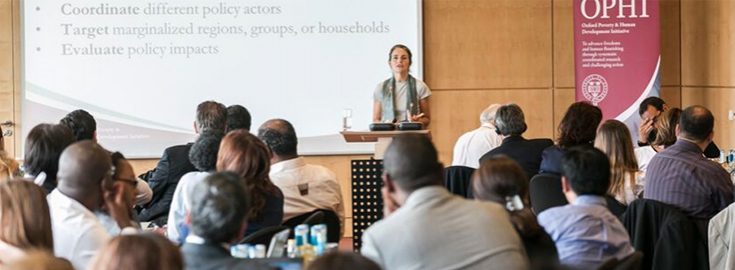
Search

What is the governance structure of the Network?
The Oxford Poverty and Human Development Initiative (OPHI) acts as the MPPN Secretariat. The activities of the Secretariat are guided by a Steering Committee made up of a cross-section of participants. In key strategic decisions related to the network, the Secretariat is guided by the Steering Committee. The annual meeting of participants reviews the work of the Secretariat and sets the MPPN priorities for the coming year.
The current members of the MPPN Steering Committee are:
- Risenga Maluleke, Statistician-General of Statistics South Africa
- Beatriz Urdinola, Director of the National Administrative Department of Statistics (DANE), Colombia
- Liu Junwen, Director General of the International Poverty Reduction Center in China (IPRCC)
- Sabina Alkire, OPHI Director
- Adriana Conconi, MPPN Director
History and Purpose of the Network
The Multidimensional Poverty Peer Network was launched in June 2013 at a distinguished event at the University of Oxford, at which Nobel Peace Laureate Juan Manuel Santos and Nobel Economics Laureate Professor Amartya Sen gave keynote addresses. The Network was established in response to the overwhelming demand for information on implementing multidimensional measures and its analysis, and for an exchange of experiences as well as technical and institutional support.
The purpose of the Network is to serve as a converging space for departments and ministries to learn from and share with global peers the challenges and actions necessary to address poverty in a more coordinated manner. Poverty, as recognised in Sustainable Development Goal 1.2.2, has multiple dimensions, and robust data and strategic coordinated policies are essential.
The Network has four main areas of work that were reaffirmed at its high-level annual meeting in Uzbekistan in 2024: (1) continue measuring poverty using the Multidimensional Poverty Index, and more importantly, its use as a policy and planning tool for high impact and effective efforts; (2) prioritise the collection and deepening of multidimensional poverty data to monitor and track progress and for evidence-based decision-making; (3) actively report their progress on reducing poverty in all its dimensions to the Global SDG Indicators Database; and (4) acknowledge and profile the level and trends of multidimensional poverty indices.
Who can participate in the MPPN?
- Governments or state-level applicants can join the Network at the Ministerial or Vice- Ministerial level (if a national government) or Governor level (if sub-national) if they are: Interested in learning about, actively participating and engaging in multidimensional poverty measurement discussions at the national, sub-national or international level.
- Regional bodies and international agencies if they: Agree to promote, advocate and/or fund multidimensional poverty measurement and be active participants in the Network. Regional bodies may be particularly interested in one item of the MPPN’s agenda (as defined below) and do not necessarily need to be active in all three areas
- Donor countries can be admitted into the MPPN if they: Are active participants in the Network and agree to promote, advocate and/or fund areas within the Network’s agenda (below). Donors may be particularly interested in one item of this agenda and do not necessarily need to be active in all three areas.
Participant Criteria
- Quality Assurance: Statistical competence and capacity for computing multidimensional poverty measures among national or sub-national statistical staff.
- Governance: Lack of corruption and transparency among the agency/agencies responsible for computing poverty data and a political commitment to poverty reduction.
- Political Sustainability: Ability for any new multidimensional poverty measure to be sustained beyond the lifecycle of a single government.
Contact
Please contact us at mppn@qeh.ox.ac.uk for any additional information or questions.
As of June 2025, ministers and senior officials from 64 countries participate in the MPPN: Afghanistan, Angola, Antigua and Barbuda, Argentina, Bangladesh, Bhutan, Bolivia, Botswana, Brazil, Burkina Faso, Cambodia, Chad, Chile, China, Colombia, Costa Rica, Cuba, Djibouti, Dominican Republic, Ecuador, Egypt, El Salvador, eSwatini, Gambia, Grenada, Guatemala, Honduras, India, Indonesia, Iraq, Jamaica, Malaysia, Maldives, Mexico, Mongolia, Morocco, Mozambique, Namibia, Nepal, Nigeria, Pakistan, Panama, Paraguay, Peru, Philippines, Rwanda, Saint Lucia, Saint Vincent and the Grenadines, Senegal, Seychelles, Sierra Leone, Somalia, South Africa, South Sudan, Spain, Sudan, Tajikistan, Tanzania, Thailand, Tunisia, Turkey, Uganda, Uruguay, Uzbekistan, Viet Nam.
A growing number of institutions also participate in the MPPN: African Development Bank (AfDB); CAF Development Bank of Latin America and the Caribbean; Commonwealth Secretariat; Federal Ministry for Economic Cooperation and Development (BMZ); Economic Commission for Latin America and the Caribbean (ECLAC); Inter-American Development Bank (IDB); Islamic Development Bank (IsDB); Organization of American States (OAS); Organisation for Economic Co-operation and Development (OECD); Organisation of Eastern Caribbean States (OECS); Oxford Poverty and Human Development Initiative (OPHI); Latin American and Caribbean Economic System (SELA); Swedish International Development Cooperation Agency (Sida); Southern African Development Community (SADC); Statistical, Economic and Social Research and Training Centre for Islamic Countries (SESRIC); United Nations Development Programme (UNDP); United Nations Economic Commission for Africa (UNECA); United Nations Economic and Social Commission for Western Asia (ESCWA); United Nations Children Fund (UNICEF); World Bank; and World Food Programme (WFP).














